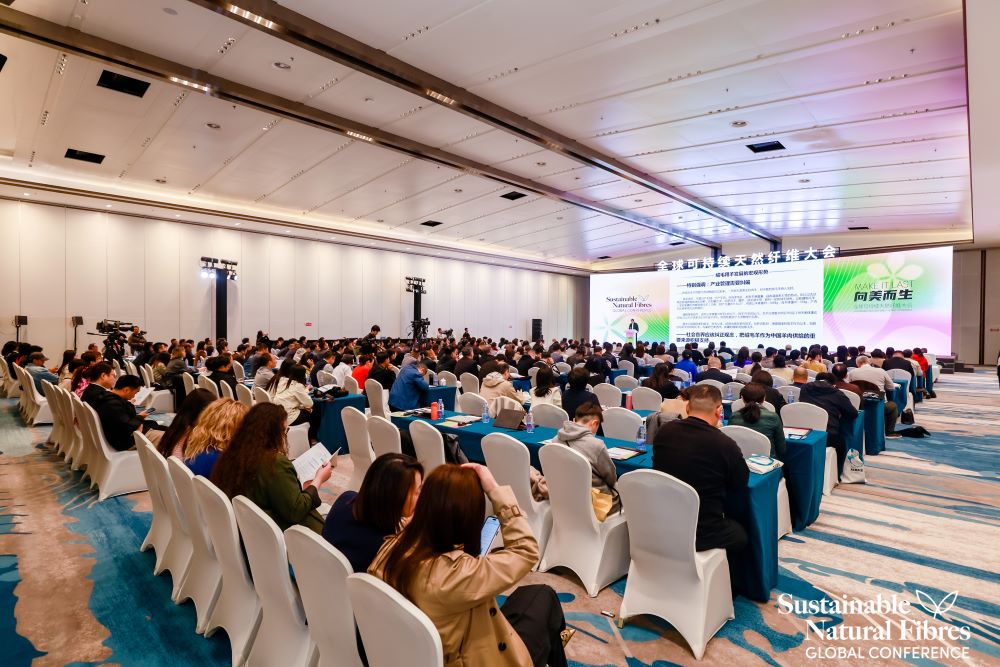Make it Last
The first Sustainable Natural Fibres (SNF) Global Conference, aimed at advancing sustainability and responsible practices within the world’s natural fibres sector, took place in Beijing, China on the 11th and 12th April 2024 with resounding success. Organised by the International Cooperation Committee on Animal Welfare (ICCAW) with support from the SFA and the Cashmere and Camel Hair Manufacturers Institute (CCMI), this international and collaborative event welcomed nearly 400 in person participants from a diverse and global community.
Covering the length and breadth of the natural fibres supply chain, the SNF Global Conference offered a platform for international speakers to highlight key topics and trends affecting the industry as a mechanism for opening global discussions and networking opportunities. With participants ranging from herders and farmers to producers and manufacturers, brands and retailers to NGOs and governmental bodies, this two-day event hosted a series of plenary sessions on the first day, with breakout meetings and consultations taking place on the morning of the second day and concluding with a special event hosted at Beijing’s U-Town Shopping Centre.
Insightful Plenary Sessions & Panel Discussions
The first day of the SNF Global Conference saw an impressive schedule, with an Opening Ceremony that included welcome speeches by 5 representatives from local government and NGOs. Immediately following was a series of 3 standout Presentations that set the stage for key areas of discussion within the Chinese natural fibres sector:
- Study on the Status Quo & Development Trend of Cashmere & Wool in China
- Present Situation & Developing Trend of Sericulture Industry in China
- Sustainable Development Practice in Feather & Down Industry
Important perspectives and insights were then brought to the forefront during the main part of the day, the Presentations & Panel Discussions, which encompassed 4 dedicated sessions each hosted by an expert chair and collectively saw 26 speakers welcomed to the stage.
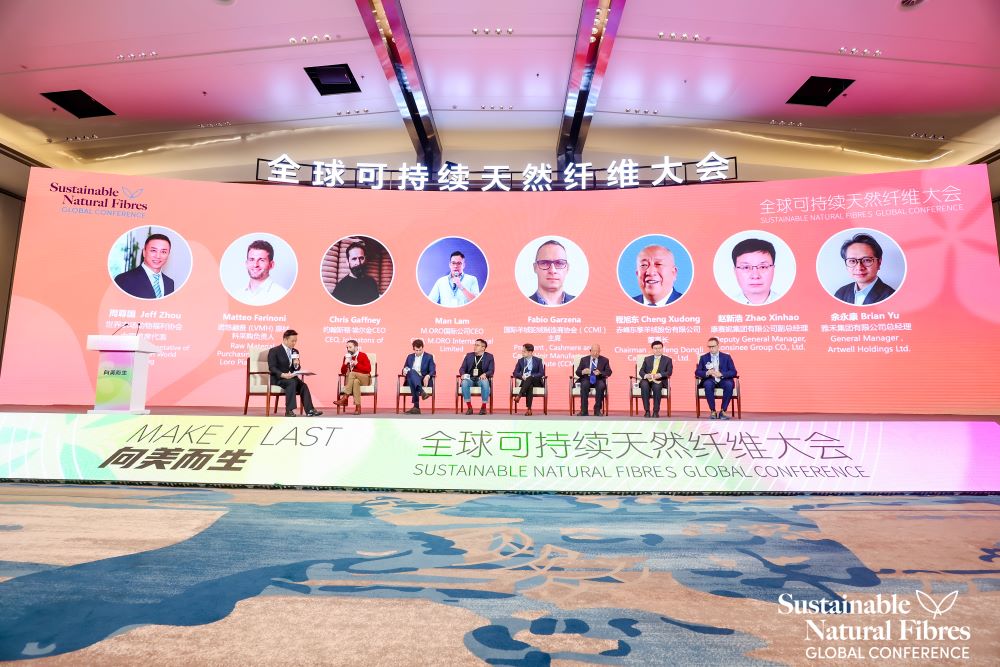
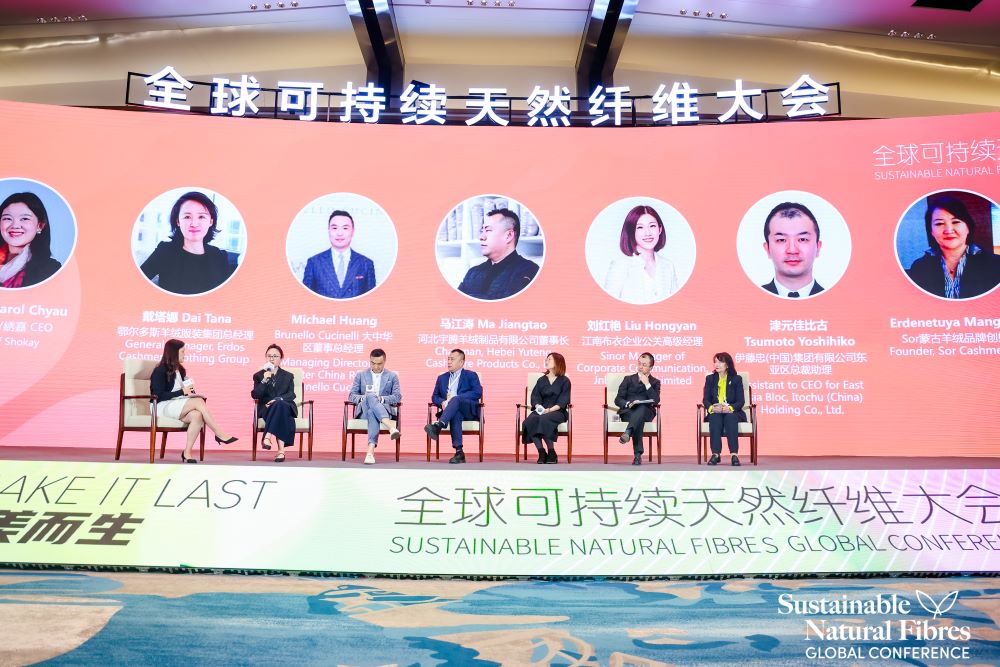
Split across 2 sessions, the Global Brands & Retailers Presentations & Panel Discussions saw many SFA brand members and partners taking part in important conversations. Chris Gaffney, CEO of Johnstons of Elgin, gave an engaging presentation on the history of the brand and their sustainability journey towards 100% certified cashmere. Erdenetuya Mangaljav, Founder of Sor Cashmere, presented an overview of the SFA-Certified Primary Processor and provided insightful information on the Mongolian cashmere and wool industry to all those present. Members of the first panel were asked to provide one sentence or word on the conference’s theme of Make it Last – their answers included the ideas of togetherness, connection, synchronicity and flexibility of all within the supply chain to create a more sustainable future for natural fibres.
Global Brands & Retailers Session One Panel Members:
- Chris Gaffney, CEO of Johnstons of Elgin
- Matteo Farinoni, Raw Material Purchasing Referent at Loro Piana
- Man Lam, CEO of M.ORO Cashmere
- Brian Yu, General Manager of Artwell
- Cheng Xudong, Chairman of Chifeng Dongli Cashmere
- Zhao Xinhao, Deputy General Manager of the Consinee Group
- Fabio Garzena, President of CCMI
Global Brands & Retailers Session Two Panel Members:
- Tana Dai, General Manager of the Erdos Group
- Michael Huang, Managing Director of Greater China Region from Brunello Cucinelli
- Ma Jiangtao, Chairman of YUTENG Cashmere
- Liu Hongyan, Senior Manager of Corporate Communication at Jnby Design
- Tsumoto Yoshihiko, Assistant to CEO for East Asia Bloc at Itochu
- Erdenetuya Mangaljav, Founder of Sor Cashmere

“If you don’t know where the fibre comes from, then you can’t improve the quality.” Chris Gaffney, CEO of Johnstons of Elgin, on the importance of traceability in the supply chain.

“It is rare for me to attend a conference on such a dedicated topic.” Tana Dai, General Manager of the Erdos Group, on the conference’s theme of global natural fibres and sustainability.
The afternoon hosted a unique opportunity during the Herders, Producers & Processors Presentations & Panel Discussions, which brought together a diverse range of speakers that represented herding and farming communities from China, Mongolia, Inner Mongolia, Afghanistan and South Africa. Ronald Lamb, Cashmere & Wool Processing Expert from DAI, gave an insightful talk on the benefits of Afghan cashmere alongside the devastating hardships that the country’s herding communities face day-to-day. Marco Coetzee, General Manager of Mohair South Africa, provided an update to conference attendees on the Mohair industry and their very own sustainability journey.
Herders, Producers & Processors Panel Members:
- Ganzorig Altangerel, Leader of Mongolia’s “Ashid Munkh Bayn” Herder Cooperative
- Munkhtsetseg Tumendemberel, Leader of Mongolia’s “Shine Burgaltai” Herder Cooperative
- Marco Coetzee, General Manager of Mohair South Africa
- Ronald Lamb, Cashmere & Wool Processing Expert from DAI Global
- Cara Loomis, Research Analyst at the SFA
- Sainculuu Amarsanaa, MEL, Partnerships & Communications Manager at SFA Mongolia
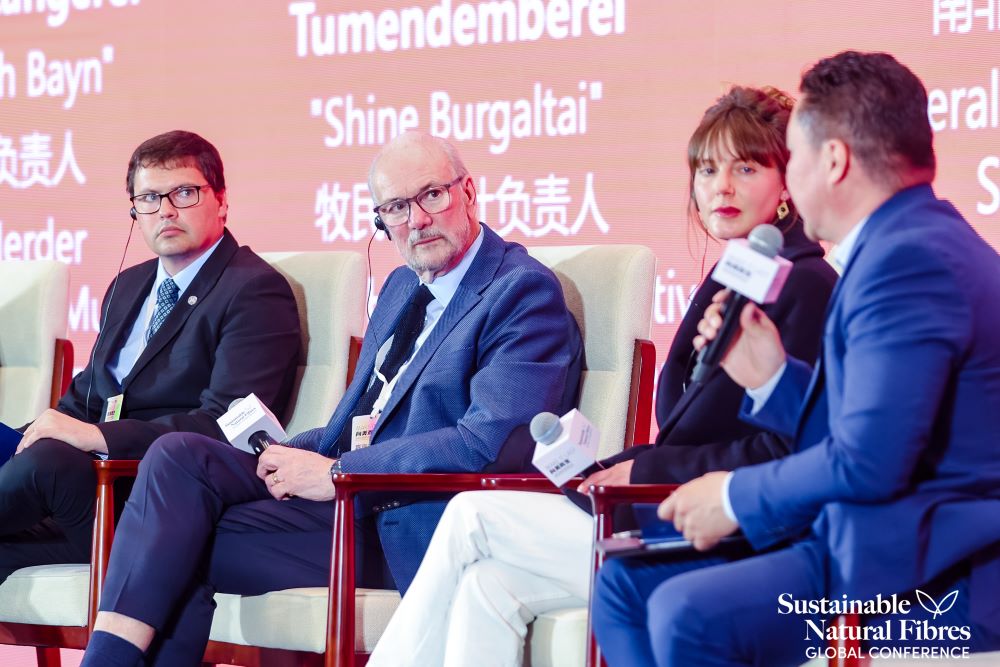

“Since childhood, we are taught to protect the land.” Ganzorig Altangerel, Mongolian Herder Cooperative Leader, on their relationship and deep connection with the environment and land around them.

“Climate change has had a significant influence on herders, as small rivers and lakes have dried up leaving little vegetation.” Munkhtsetseg Tumendemberel, Mongolian Herder Cooperative Leader, on the visible changes they have witnessed due to climate change.
The chair for the panel discussion, Chu Xueqin, Campaign Manager at World Animal Protection China, concluded the session with a statement that truly encapsulated the global and collaborative aims of the event, to advance sustainability and responsible practices within the world’s natural fibres sector:
"We are not divided by borders."
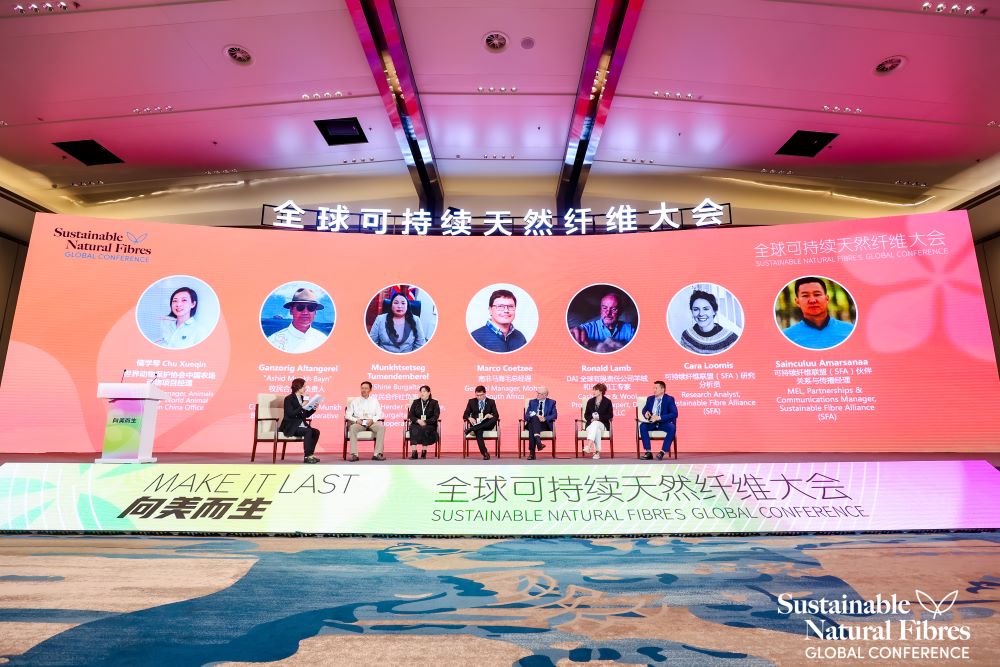
Next to present was Eco-Age’s CEO, Harriet Vocking, and Woolmark’s Greater China Senior Manager of Marketing Communications and Sustainability, Holly Ho, who talked about the effects of legislation, such as PEF, within the industry.
Harriet’s presentation shifted the focus of the conference to the connection with the consumer, showcasing many of Eco-Age’s engaging projects and influential activities alongside Woolmark’s Filter by Fabric campaign. Holly provided insightful information on sustainability within the Chinese market, followed by a deep dive into consumer insights and Woolmark’s recent projects within China.

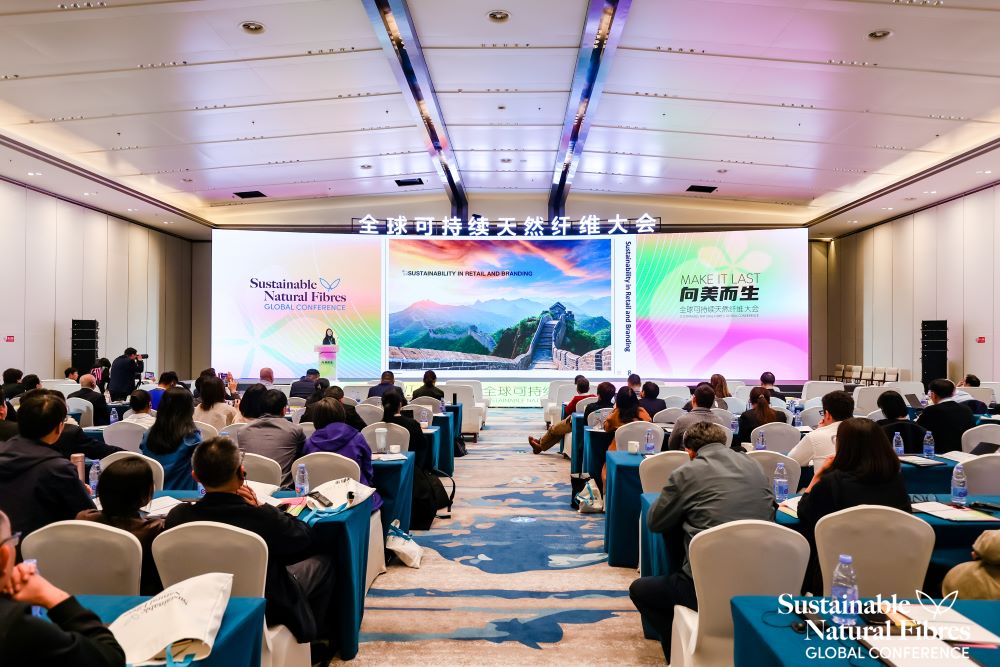

“It is possible, if we make enough noise, to make change.” Harriet Vocking, CEO of Eco-Age.
Concluding the first day of the SNF Global Conference was the Animal Welfare & Certifications Panel Discussion that brought together ICCAW’s Vice President, Ayongxi, SFA’s CEO, Una Jones, RSPCA’s Head of International, Paul Littlefair, and the Deputy Dean of Inner Mongolia’s Academy of Agricultural & Animal Husbandry Sciences, Sun Haizhou, to talk about this significant topic that goes hand-in-hand with the world of animal-derived natural fibres.
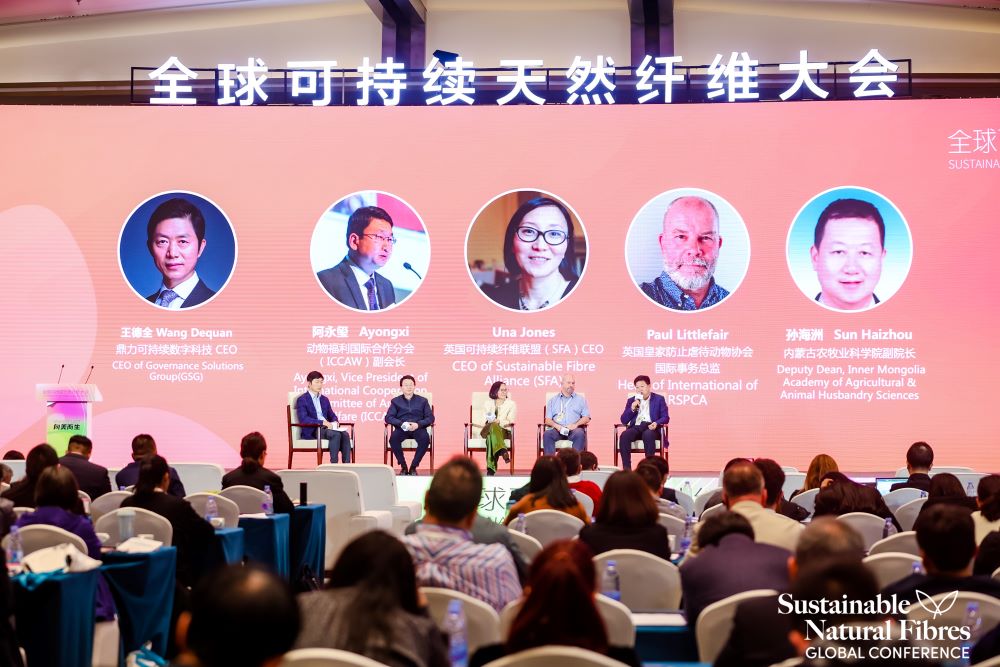
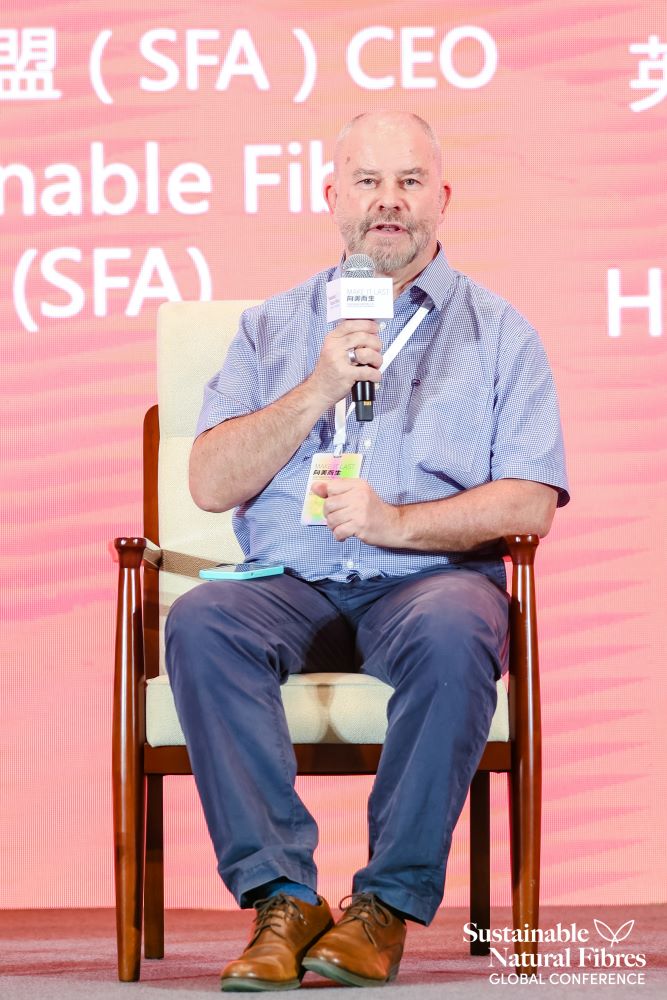
“To show ‘this is what we do and how we deal with it’ is crucial to the consumer.” Paul Littlefair on the fundamental connection between natural fibre standards and best practice animal welfare for brands and retailers in the global fashion market.
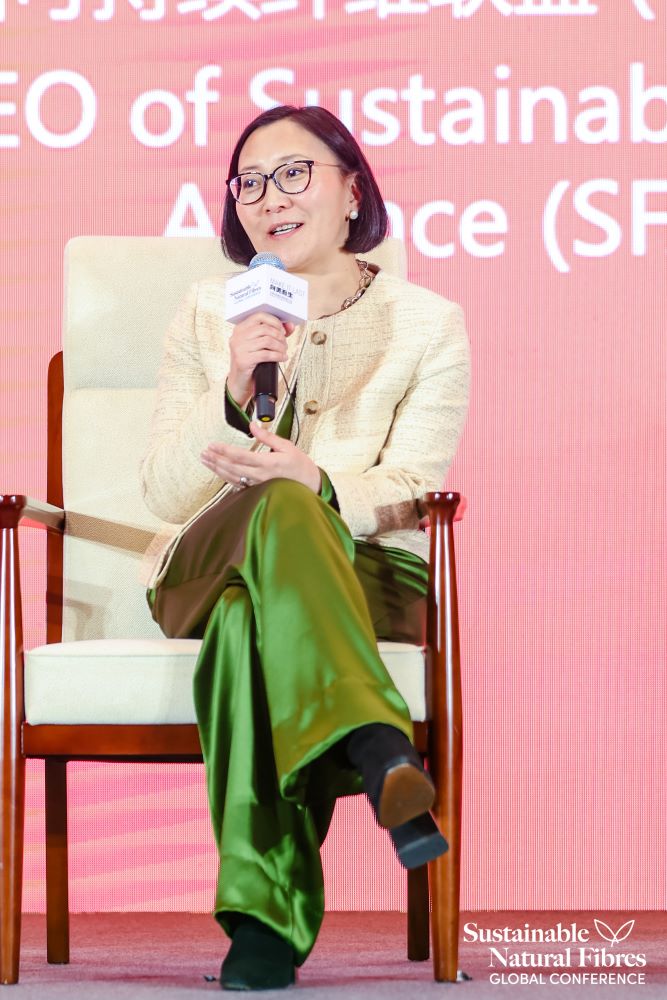
“We [SFA] initially followed the five freedoms of animal welfare but last year changed to the five domains, which works better with indigenous herders.” Una Jones on the importance of working together with herding communities to improve animal welfare practices.
Engaging Breakout Sessions & Roundtable Consultations
The morning of the second day saw the conference focus on fibre and project specific sessions with 4 dedicated and simultaneous breakout events available for attendees to join. These were:
- Cashmere & Wool Industry Session
- Down & Feather Industry Session
- Silk Industry Session
- Rangeland Stewardship Council – Global Rangeland Standards & B4L Consultations

SFA’s Head of Standards, Dr. David McElroy, spoke during the Cashmere & Wool Industry Session on the importance of chain of custody and traceability within the animal fibres sector, presenting a case study on the process of SFA & ICCAW certified cashmere. “It is just so inspiring to see so many different people, from different backgrounds, who are passionate about the same things that we are passionate about.” says David following the Cashmere & Wool Session. “There are really big challenges within the world – within the cashmere industry – and to see so many people who are interested to solve these problems, and have so many ideas to do so, is great.”
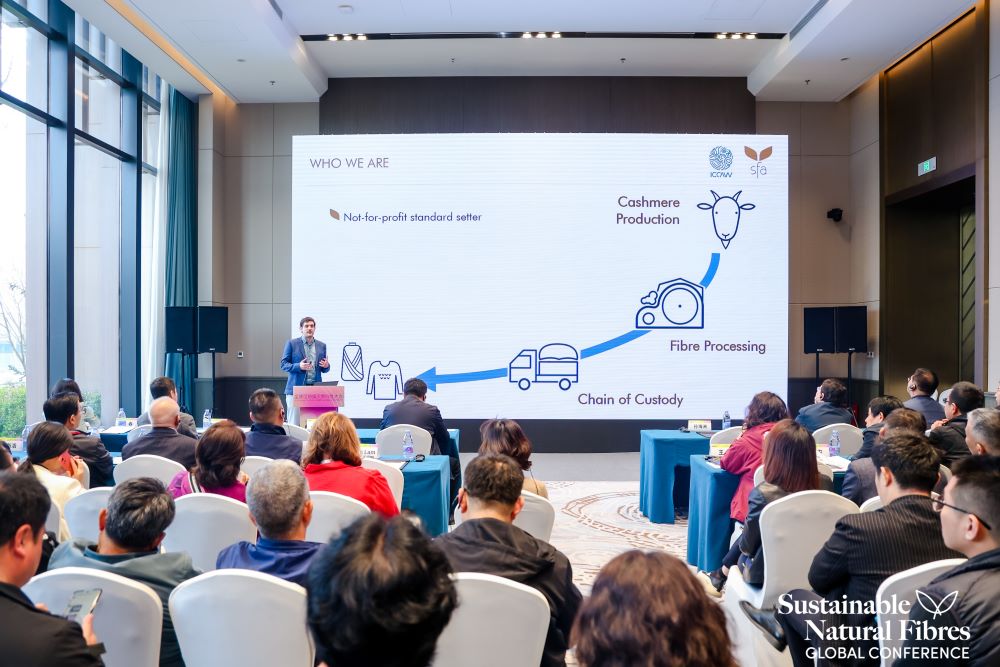
Running alongside was the Rangeland Stewardship Council – Global Rangeland Standards & B4L Consultations Session. Hosted by the SFA and UNCCD, the event received support from the GEF-funded STELARR (Sustainable Investments for Large-Scale Rangeland Restoration) Project, which is implemented by IUCN and executed by ILRI. SFA’s CEO, Una Jones, begun proceedings with an introduction to the Rangeland Stewardship Council (RSC) and its mission to advance the sustainable management of the world’s rangelands.
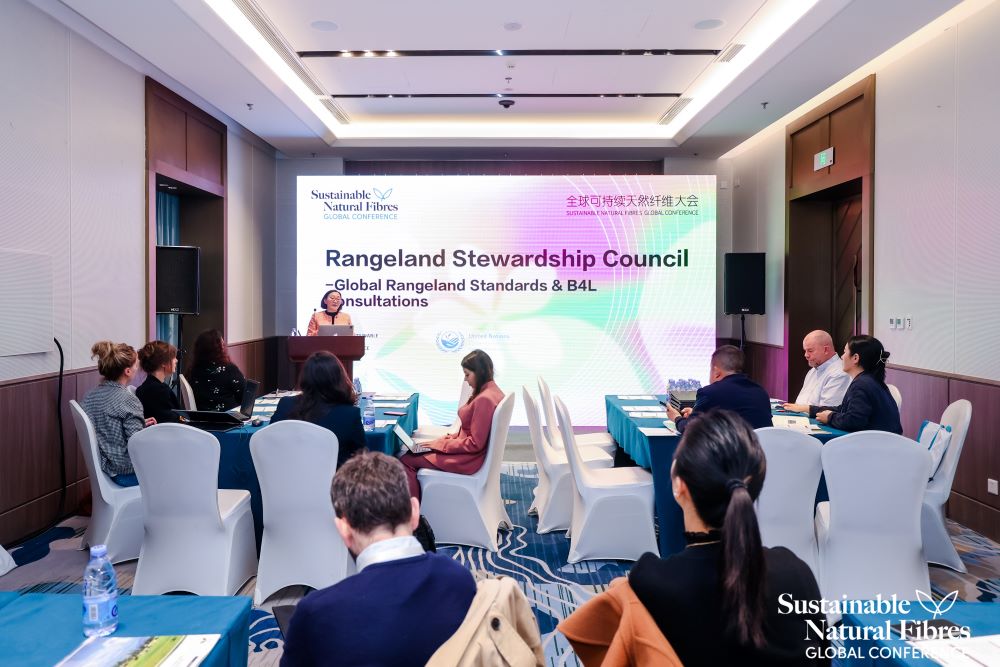
The first part of the session provided a platform for a range of expert speakers to present on different inputs and outputs relevant to the RSC, including land degradation neutrality, animal welfare, value chains, One Health, and more.
RSC Session Speakers:
- Sarah Toumi, Donor Relations & Private Sector Engagement at UNCCD
- Peter Hughes, Head of Sustainable Business Development at Eurofins | BLC
- Una Jones, CEO of the SFA
- Fiona Flintan, Senior Scientist Rangelands & Pastoralism at ILRI
- Paul Littlefair, Head of International at RSPCA
- Dr. Cara Loomis, Research Analyst for the SFA


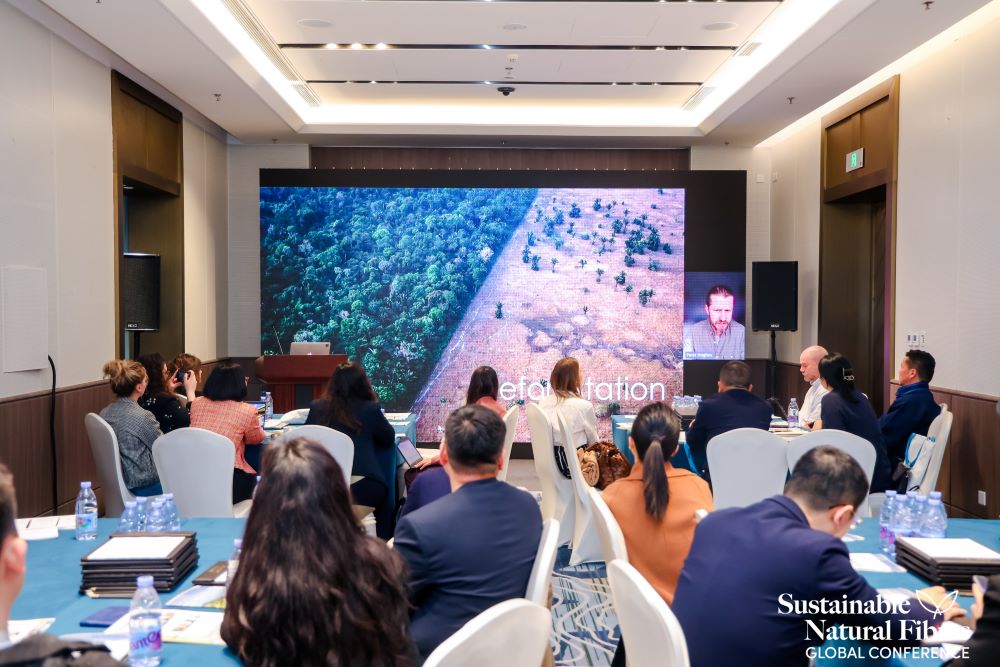
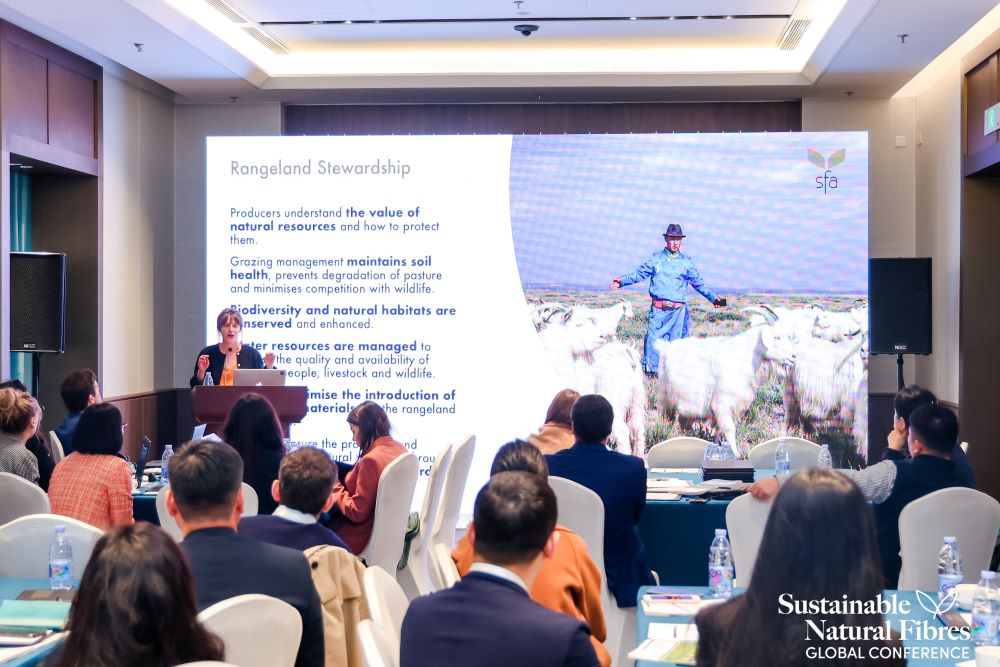
After the presentations concluded, guests of the session were invited to break into 2 groups to discuss global indicators for rangeland stewardship and the challenges and opportunities each of these indicators come up against. The main challenges discussed included the use of hazardous materials and pesticides, stocking rates, the economic and social aspects of the rangelands, migratory and grazing patterns, and the importance of herding and indigenous communities in rangeland management.

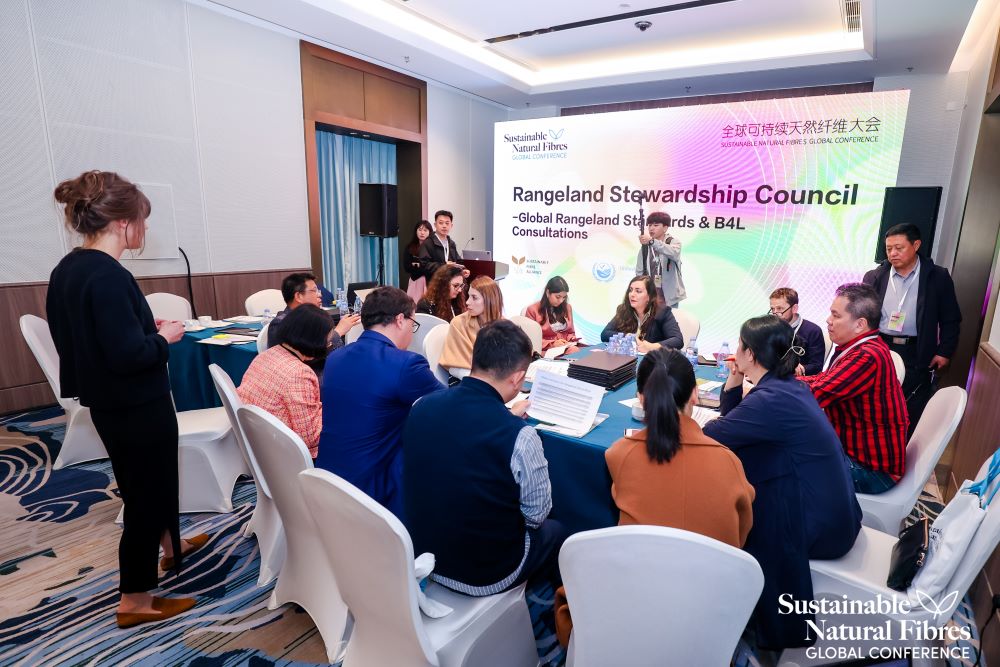
The session closed with a presentation provided by UNCCD’s Associate Programme Officer, Radhika Jain, on the organisation’s Business for Land (B4L) Strategy. “What asks do you have from UNCCD – organisations like the UN, other international organisations, governmental bodies – and what can we do to facilitate your task?” a question that Radhika posed to those present towards the end of the session. “We have always been ‘what can the private sector do for us?’ but I [UNCCD] think it should be the other way around. We are facilitators for you, so we can all work in a holistic environment.”
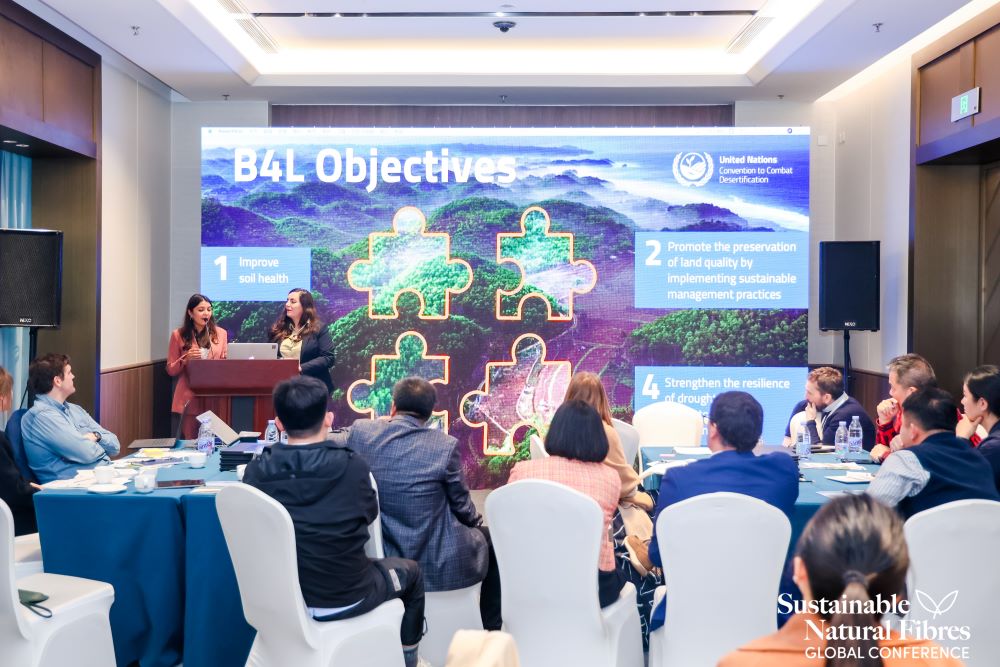
Youth Sustainable Forum at U-Town Shopping Centre
During the afternoon of the second day, the SNF Global Conference co-hosted a special event within one of Beijing’s biggest shopping centres, U-Town. The Youth Sustainable Forum focused on providing engaging, consumer-level information from different areas of the natural fibres industry to an audience comprising both conference attendees and members of the general public, beginning with a fashion showcase.
Speakers at the event included Liu Fei, Brand Communication Manager of the Erdos Group, and Lauren Moore, Head of Communications & Sustainability at Mohair South Africa. This forum created a vital connection for the SNF Conference to engage directly with customers and the public to discuss important issues of sustainability and development to generate wider conversation.
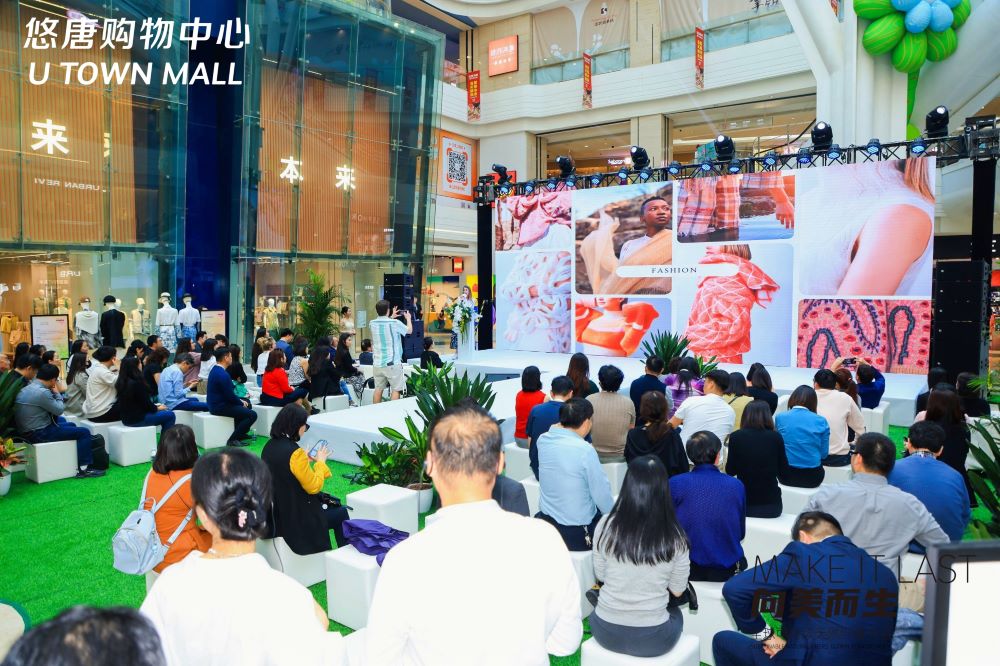
Factory Tours of YUTENG & M.ORO Cashmere
On the Saturday directly following the conference, the SFA team and many of the SNF event attendees travelled from Beijing to China’s Hebei province where they had the unique opportunity to visit and tour two cashmere facilities – YUTENG and M.ORO Cashmere. For some, it was their first exposure to the cashmere manufacturing process, with team members from the facilities on hand to provide in-depth information and knowledge into the processes of dehairing, scouring, sorting, spinning, dyeing and more, which took place within the factories. A special thanks to YUTENG and M.ORO Cashmere for organising and hosting this incredible and educational excursion!

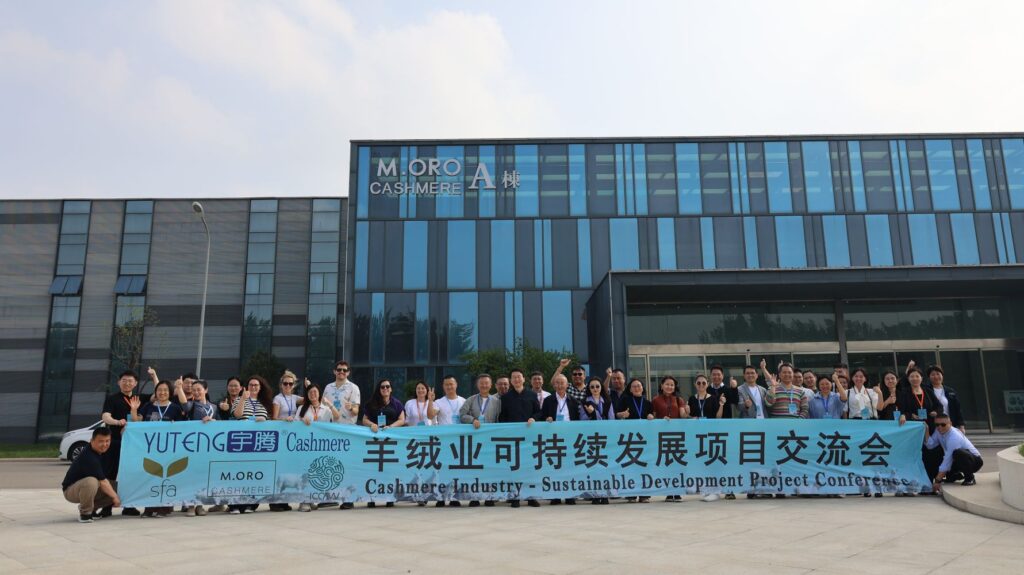
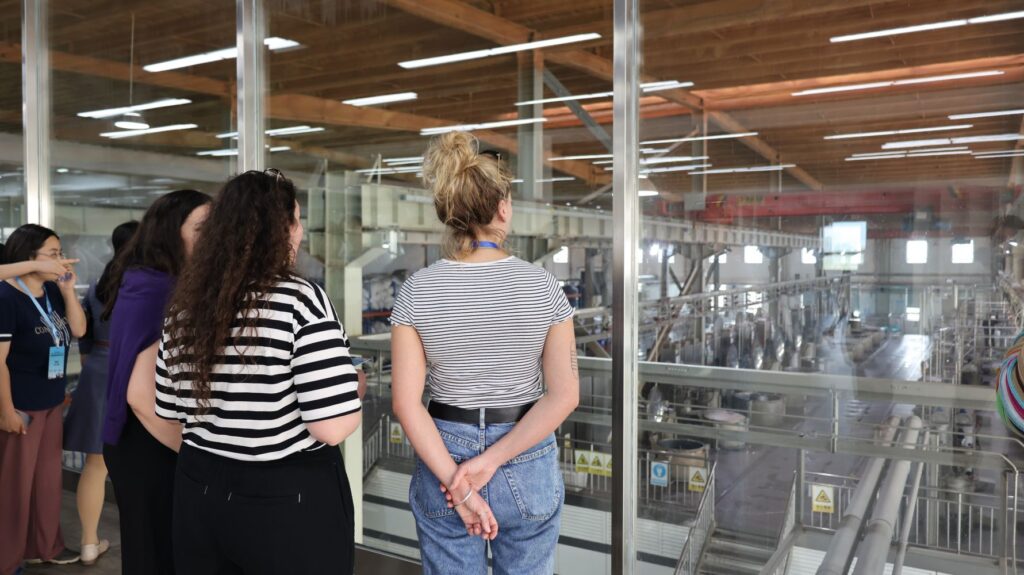
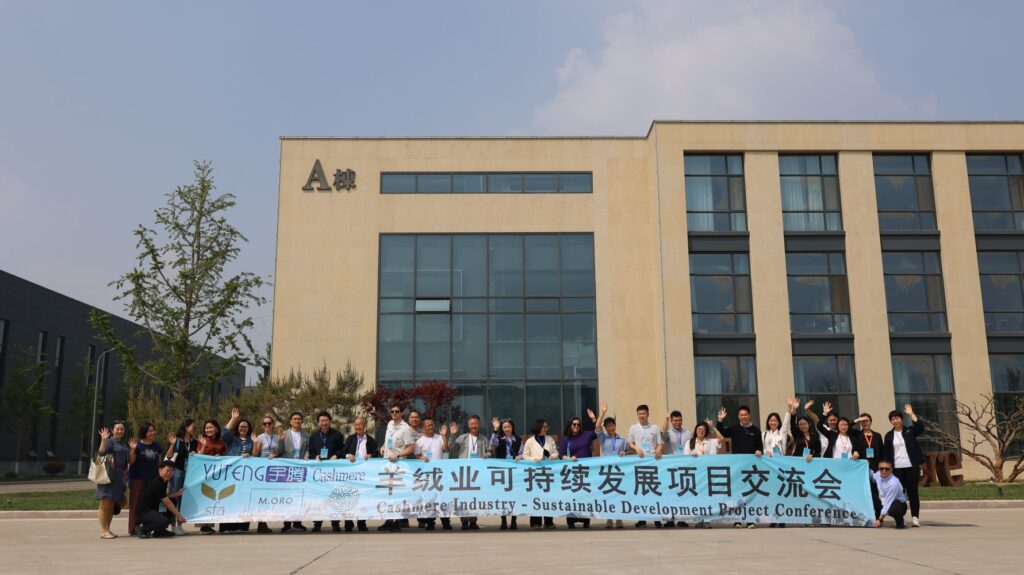
Thank you!
As co-organisers and supporters of the conference, the SFA team would like to say a heartfelt thank you to the conference hosts, the International Cooperation Committee on Animal Welfare (ICCAW) of the China Association for the Promotion of International Agricultural Cooperation (CAPIAC), for creating a beautiful and engaging event.
We would also like to thank all of our incredible partners, members and industry friends for their wonderful support both in attending and participating in the many sessions and panels of this two-day event.
We hope that the discussions and conversations that have taken place will help to drive collaboration towards a more sustainable future of the natural fibres sector and foster relationships that will encourage development to Make it Last.
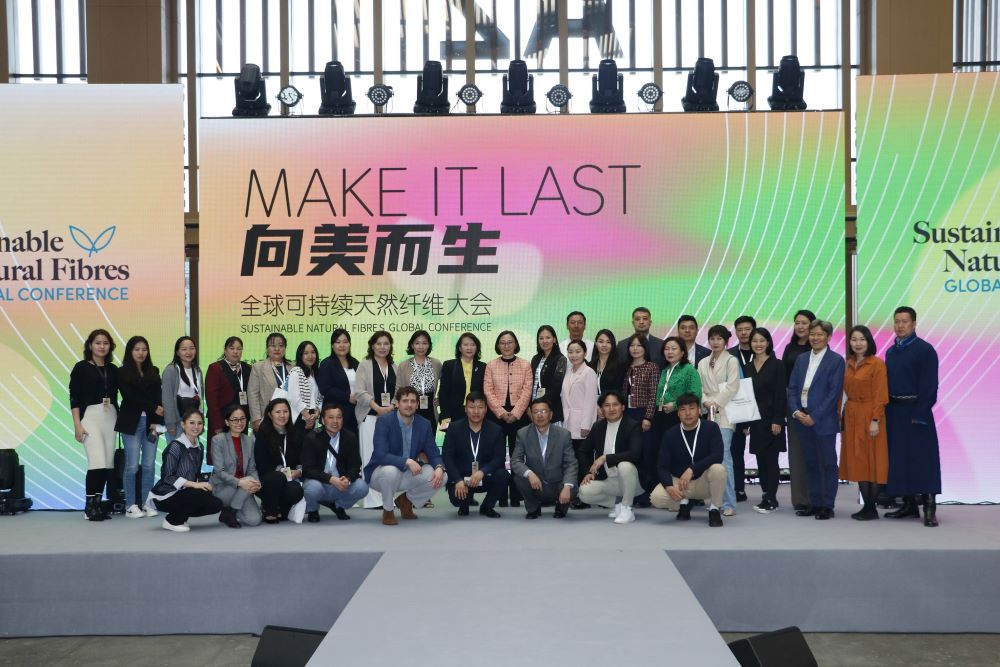

Katy Edwards
SFA MARKETING & COMMUNICATIONS MANAGER
Update: 14 May 2024

